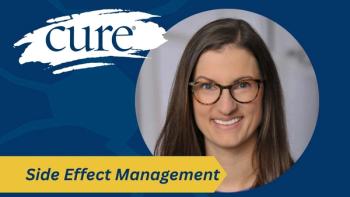
- Spring 2018
- Volume 1
- Issue 1
Hold the Phone
Mobile apps may help teens and young adults stick with their medication schedules, a nurse scientist finds.
With every cancer diagnosis comes a detailed treatment plan that usually includes a seemingly endless list of multisyllabic medications. Remembering what to take, and when, can be a challenge for anyone, but evidence shows that it’s especially difficult for adolescents and young adults (AYAs) who have cancer. These patients, ages 15 to 39, are particularly susceptible to missing medications, mainly due to lifestyle issues, and this has been associated with poorer outcomes and the potential for relapse.
A solution might lie in the palms of their hands, according to a team of nurse researchers at Huntsman Cancer Institute at the University of Utah in Salt Lake City. They theorized that a medication-reminder smartphone app would improve adherence rates.
“Studies of children and adolescents with acute lymphoblastic leukemia indicate that less than 95 percent adherence to their cancerrelated medications is associated with a 2 ½ times increased risk of relapse,” says nurse researcher Lauri Linder, Ph.D., APRN, CPON, an Oncology Nursing Society (ONS) member. “Patients who experience relapses of their disease are then at risk for decreased long-term survival. This age group is at greater risk for poor adherence, and the AYA population’s cancer-related outcomes have not improved at the same rates as younger children.”
AYA patients face unique challenges, according to Linder.“This population is a distinct developmental group. They are gaining independence from their families and are assuming greater responsibility for their own medication adherence,” she says. “Their schedules also tend to be complex — many are attempting to balance work, school, social activities and family life. Complex personal schedules make remembering to take medications more difficult.” Is there an app for that? Linder and her colleagues sought to find out.
TRACKING ADHERENCE THROUGH MEDICATION REMINDERS
The prevalence of AYAs’ smartphone use, coupled with their need for improved medication adherence, presented an opportunity to understand whether technology could make a difference. With funding from the ONS Foundation, the team reached out to software developers.
“For our study, we used a commercially available app, Dosecast, developed by Montuno Software,” Linder says. “Montuno supported our team by providing participants with a code to allow them to access the Dosecast Pro edition for one year at no cost. They also provided our team with app usage data for each participant.”
After downloading the app, participants entered information, including medications and desired reminders. When it was time for a dose, the app would send a reminder that prompted the patient to select from three options: take now, postpone or skip.
The study results showed that patients who scored highly for adherence at baseline usually continued to take their medications in a timely manner — but with less variation in their schedules, which Linder considers encouraging. Using the app had less impact on those with low baseline adherence, but, according to Linder, a small third subset across both groups showed clearly improved adherence. Most participants reported that they found the app helpful and easy to use and would recommend it to others.
“Smartphone-based apps are just one resource that addresses one aspect of promoting oral medication adherence,” Linder says. “Reasons for nonadherence are as diverse as our patients themselves. Although forgetfulness is a frequently cited reason for nonadherence, the reasons for forgetfulness vary greatly. Future studies can help us better understand how technology-based interventions, such as smartphone apps, can help in practice.”
MOVING THE NEEDLE ON PATIENT-CENTERED RESEARCH
Oncology nurse researchers like Linder strive to make advancements in cancer care research that improve experience, outcomes and quality of life for their patients. “The ONS Foundation has a very important role in oncology nursing research,” Linder says. “Having access to funding resources is essential to developing nurse scientist ideas. The funding support that we received from the ONS Foundation was essential to our being able to conduct this study.”
Individuals seeking to support patient-centered cancer research can invest in the work of oncology nurse scientists through the ONS Foundation, which is dedicated to supporting the nurses who care for patients with cancer.
Articles in this issue
over 7 years ago
A Time for Actionover 7 years ago
The Center of Attentionover 7 years ago
Team Playerover 7 years ago
Straight to the Heartover 7 years ago
Unbreakable Bonds


